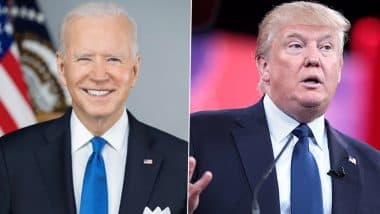Washington, January 16: President Joe Biden and President-elect Donald Trump are both claiming credit for Israel and Hamas agreeing to a ceasefire deal in Gaza on Wednesday after the White House brought Trump's Middle East envoy into negotiations that have dragged on for months. Trump wasted no time in asserting he was the moving force behind the deal, whose final details were still being ironed out, according to Israeli Prime Minister Benjamin Netanyahu's office. Biden, meanwhile, stressed that the deal was reached under “the precise contours” of a plan that he set out in late May.
“This EPIC ceasefire agreement could have only happened as a result of our Historic Victory in November, as it signaled to the entire World that my Administration would seek Peace and negotiate deals to ensure the safety of all Americans, and our Allies,” Trump wrote on social media. “I am thrilled American and Israeli hostages will be returning home to be reunited with their families and loved ones.” 'Is That a Joke?': Joe Biden's Response to 'Who Deserves Credit for Israel-Hamas Ceasefire Deal' Question Goes Viral (Watch Video).
Trump added that his incoming Mideast envoy, Steve Witkoff — who was participating in the talks in Doha, Qatar — would continue “to work closely with Israel and our Allies to make sure Gaza NEVER again becomes a terrorist safe haven.” Biden said from the White House that "my diplomacy never ceased in their efforts to get this done.” “It is the result not only of the extreme pressure that Hamas has been under and the changed regional equation after a ceasefire in Lebanon and weakening of Iran — but also of dogged and painstaking American diplomacy,” Biden said.
The jostling comes with both Biden and Trump determined to see the deal become a set piece of Middle East success for the legacy of their presidency. Biden's administration worked for months to broker peace in talks that inched frustratingly close to success before repeatedly breaking down. Trump, for his part, had warned of “hell to pay” if a deal wasn't done by his inauguration — in five days. While Biden's refusal to impose meaningful restrictions on sending arms to Israel may have helped the key US ally seriously degrade Hamas and fellow Iran-backed militant group Hezbollah in Lebanon, it also came with enormous suffering for innocent Palestinians and Lebanese who have been caught in the crossfire of the 15 months of grinding war. Israel-Hamas Deal: Complete Ceasefire, Withdrawl of IDF Forces From Gaza and Release of Hostages; US President Joe Biden Outlines 3 Phases of Breakthrough Negotiations.
Jonathan Panikoff, director of the Scowcroft Middle East Security Initiative at the Atlantic Council, said Biden deserves praise for continuing to push the talks despite repeated failures. But Trump's threats to Hamas and his efforts through Witkoff to “cajole” Netanyahu deserve credit as well, he said. “The ironic reality is that at a time of heightened partisanship even over foreign policy, the deal represents how much more powerful and influential U.S. foreign policy can be when it's bipartisan,” he said. “Both the outgoing and incoming administration deserve credit for this deal and it would've been far less likely to happen without both pushing for it.”
In his White House remarks, Biden said his administration negotiated the deal but that Trump's team will soon be charged with making sure it's implemented.
“For the past few days, we have been speaking as one team,” Biden said in a nod to Witkoff being part of the talks. Trump's team pushed back, saying Biden couldn't get the deal done until Trump and Witkoff intervened. The Biden administration was handing the Trump administration a detailed roadmap to win a lasting peace that has broad support in the region, State Department spokesman Matthew Miller said.
“The involvement of President-elect Trump's team has been absolutely critical in getting this deal over the line,” Miller told reporters. "And it's been critical because obviously, as I stand today, this administration's term in office will expire in five days.” Israeli President Isaac Herzog offered his gratitude to both the incoming and outgoing U.S. presidents. Nancy Okail, head of the US-based Center for International Policy, said acceptance of the deal in the face of Trump's insistence that a ceasefire be in place when he takes office “ironically shows how effective actual pressure can be in changing Israeli government behavior."
(The above story is verified and authored by Press Trust of India (PTI) staff. PTI, India’s premier news agency, employs more than 400 journalists and 500 stringers to cover almost every district and small town in India.. The views appearing in the above post do not reflect the opinions of LatestLY)












 Quickly
Quickly


